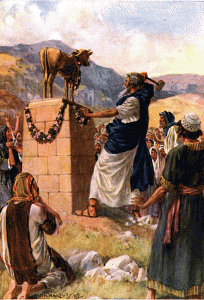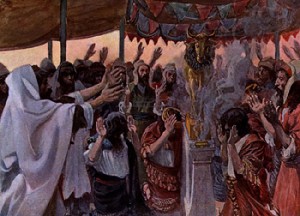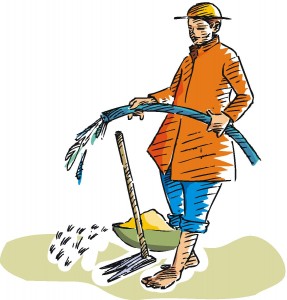In Revelation 18:4, Elohim pleads with his people to come out of the end times Babylon the Great worldwide Antichrist system. The first steps to doing this is explained in this video.
Tag Archives: Babylon
The Law of Reaping and Sowing — Often Learned Through the School of Hard Knocks
Genesis 28:22, I will surely give the tenth. To whom would Jacob ultimately tithe? We don’t know, but Jacob may have been making a prophecy about his descendants bringing their tithes and offerings to the house of El or the temple that would eventually be built on that exact spot.
Jacob’s dream in Genesis 28 was his first, life-changing personal encounter with the Elohim of his fathers (Gen 28:10ff). What is his response? It was to serve YHVH and to worship him by giving him one-tenth (a tithe) of his increase (verse 22).
What prompted this response on Jacob’s part? Why was such a response appropriate? When did you have your first encounter with your Heavenly Father and Master? Have you faithfully used the first fruits of your increase to honor, worship and express gratitude to him ever since? If not, why not? Scripture calls not tithing “robbing Elohim” and that as a result a curse may be on your finances (see Mal 3:8–11). Proverbs 3:9 lays out a solid truth about how tithing is a form of worshipping the Creator. “Honour [glorify] YHVH with thy substance, and with the first fruits of all thine increase, so shall thy barns be filled with plenty, and thy presses shall burst out with new wine.”
The Scriptures reveals the spiritual law of reciprocity: You reap what you sow (Gen 8:22; Gal 6:7–9). If you don’t sow you will not reap. If you sow evil or good you will reap the same. Jacob had to learn this law the hard way. In Job 4:8 we read, “Even as I have seen, they that plow iniquity, and sow wickedness, reap the same.” Jacob gained the birthright through posing as Esau (a deception) and Laban in turn deceives Jacob by putting Leah under the veil posing as Rachel in Jacob’s marriage bed. It is very easy to see the principle of reaping and sowing Continue reading
Have You Come Out and Crossed Over?
Numbers 22:5, Pethor … by the river. Balaam was from the land of Pethor, which is “by the River.” This is a reference to the Euphrates River, the great river of Babylon (The ArtScroll Stone Edition Chumash, p. 857). Thus Balaam was a Babylonian, although he may have been a transplanted Edomite according to some Jewish scholars (see The ArtScroll Bereishis/Genesis Commentary on Gen 36:32).
One of the aspects of Babylon of the last days is her religious system (Rev 13:11ff), the head of which is the false prophet (Rev 16:13; 19:20; 20:10). The Babylonish religious system of the end days is a blend of both good and evil (reminiscent of the tree by that name in Eden from which the serpent beguiled Adam and Eve away from YHVH’s path of truth and righteousness into a false religious system).
In the last days, YHVH is calling his people out of that false religious system (Rev 18:4) with its false prophets who prophesy a mixture of good and evil. What religious system is this scripture referring to that YHVH’s people are caught up in? Reflect on the implications of this. To what degree have you heeded YHVH’s call to “come out of her”—namely, any man-made religious or church system that is contrary to the Word of Elohim?
The Scriptures seems to indicate that Balaam had some knowledge of the truth of YHVH but refused to wholeheartedly submit to YHVH (2 Pet 2:15). If this is the case, who or what system today could fit this same pattern? Let us not forget Yeshua’s warning about false prophets arising in the last days who might deceive the very elect (Matt 24:24).
Numbers 22:10ff, Carnal men want to be like YHVH’s saints, to be recipients of the blessings of Israel, and to be numbered among YHVH’s chosen, but few want to walk the walk required to receive these blessings and privileges.
Many will “court YHVH” by getting as close to him as possible without actually crossing over (becoming an Ivrit/Hebrew) and surrendering their all to him. The sacrifice of doing so is too great for most. To cross over to YHVH’s side means that fame and fortune must be laid aside and one must become a servant-slave of YHVH. Balaam couldn’t cross over.
How serious are you about serving YHVH?
It is said of the end-times saints that they loved not their lives unto death (Rev 12:11). Paul declares that followers of Yeshua must become “living sacrifices” in service of YHVH (Rom 12:1). Yeshua gave his very life for you. Are you holding back some of your life for him? Do the cares of this world, the desire for pleasures, material goods, entertainments or acclaim still have a grip on your heart? Are they preventing you from moving into your spiritual calling and destiny—to truly walk by faith?
Come out of Babylon, My People!
Genesis 31, Laban and Balaam. It is quite possible that the false prophet Balaam, who heard from YHVH and had a sense of righteousness, though was still steeped in paganism, was a descendant of Laban. Both were from Aram (part of greater Babylon) and only 280 years separated them. One of the Aramaic Targums (Targum Jonathan) equates Balaam with Laban, while other scholars view Balaam as Laban’s grandson.
Whatever the case, both Laban and Balaam were involved in a mixed-religious system—some truth and some error, some good and some evil.
This is the nature of religious Babylon (meaning “mixture” or “confusion”). A mixture of what? Of good and evil.
Remember the tree by that name in the Garden of Eden? Who was the one who enticed man to indulge in that fruit in rebellion to YHVH’s commands? Is not religious Babylon of today, out of which YHVH is calling his people (Rev 18:4), just that—a mixture of truth and pagan lies? How else, for example, do we account for the name of the Christian festival called Easter or Ishtar named after the Babylonian sex goddess of fertility? Or how else do we account for the Christmas tree phallus symbol that also originated from Babylonian sex worship? Or how about the Easter egg (an ancient Babylonian fertility or sex symbol) or the egg on the Jewish Passover Seder plate? All these are symbols of pagan sex worship.
As YHVH called Jacob away from Babylon back to Beth-el (the House of El), and as YHVH turned Jacob’s heart back to the ways of his fathers, is not the same YHVH likewise now calling his people to come out of religious Babylon (Rev 18:4), to separate themselves from that which is unclean or not kosher (2 Cor 6:17)? Yes, YHVH is now calling the modern descendants of Jacob (redeemed Israelites) to remember the Torah of Moses his servant and to listen to the spirit of Elijah as the children’s hearts turn back to the fathers (Mal 4:4–6).
The Golden Calf and the Church
Exodus 32, The Golden Calf Incident: A Prophetic Picture of the Church
On Shavuot (the Feast of Weeks or Pentecost), at Mount Sinai, YHVH entered into a marriage covenant with the children of Israel, but they were not ready to live up to the terms of that covenant.
Those terms, simply stated, involved the Israelites being faithful and obedient only to YHVH, Israel’s Elohim (God) and spiritual husband, and to his instructions in righteousness, the Torah. This Israel quickly demonstrated they were not willing to do, for they had hardly said “I do” to their marriage vows (Exod 24:3,7) when they made and began worshipping a golden calf—a pagan deity from Egypt — and calling it YHVH.
 Between the time of the festival of Shavuot and Yom Teruah (the Day of the Awakening Blast) when Moses received the second tablets of stone from YHVH containing the Ten Commandments, the children of Israel, the bride of YHVH, prepared herself not only to receive YHVH’s instructions again, but this time to be faithful to her marriage vows. This Israel did. She remained faithful to YHVH for approximately 38 years while trekking through the wilderness of Sinai, after which she entered the Promised Land and “stayed the course” until after the death of Joshua.
Between the time of the festival of Shavuot and Yom Teruah (the Day of the Awakening Blast) when Moses received the second tablets of stone from YHVH containing the Ten Commandments, the children of Israel, the bride of YHVH, prepared herself not only to receive YHVH’s instructions again, but this time to be faithful to her marriage vows. This Israel did. She remained faithful to YHVH for approximately 38 years while trekking through the wilderness of Sinai, after which she entered the Promised Land and “stayed the course” until after the death of Joshua.
Similarly, redeemed Israel of the first century A.D. era received the Torah on the fleshly tablets of their hearts written by the finger of the Spirit of Elohim on the Day of Pentecost (Shavuot) as recorded in Acts 2. But starting at about A.D. 70 with the destruction of the temple in Jerusalem and continuing up through the Second Jewish Revolt of A.D.135 until the time of Emperor Constantine (in the fourth century), the first-century spiritual bride of Messiah had, for the most part, abandoned YHVH’s Torah-commandments and turned, to one degree or another, to a mixed form of worship (of which ancient Israel’s worship at the golden calif was a prophetic foreshadow) where some pagan practices were assimilated into the early churches’ belief system (most notably, Sunday replaced the Sabbath, and Christmas and Easter replaced the biblical feasts).

In our day, YHVH is calling out a remnant of people from the church who are leaving behind the pagan traditions of golden calf worship and who are returning to the ancient blessed paths of YHVH’s Torah-instructions in righteousness. Does not the book of Revelation speak of a group of end-time saints who will say “I do” to YHVH, and whose identifying mark is their faith in Yeshua the Messiah (i.e., the gospel message) and yet who faithfully keep YHVH’s Torah-commandments (Rev 12:17 and 14:12)?
When Yeshua returns on or near Yom Teruah (the Day of the Awakening Blast) at the end of the age, he will be ready to marry a bride that is without spot and wrinkle who has come out of the Babylonish religious whore system (Rev 18:4). This bride who will be wearing the robes of righteousness of Torah-obedience (Rev 12:17; 14:12; 19:7–9, and she will be ready to enter into a covenantal agreement—a wedding contract or ketubah—with Yeshua, the Bridegroom ever to remain faithful to him and never again to return to Baal or golden calf worship. He will lead his wife into the Messianic Age or Millennium, even as he in the pillar of fire through Joshua (in Hebrew, Yeshua) led the younger generation of wilderness Israelites into the Promised Land.




